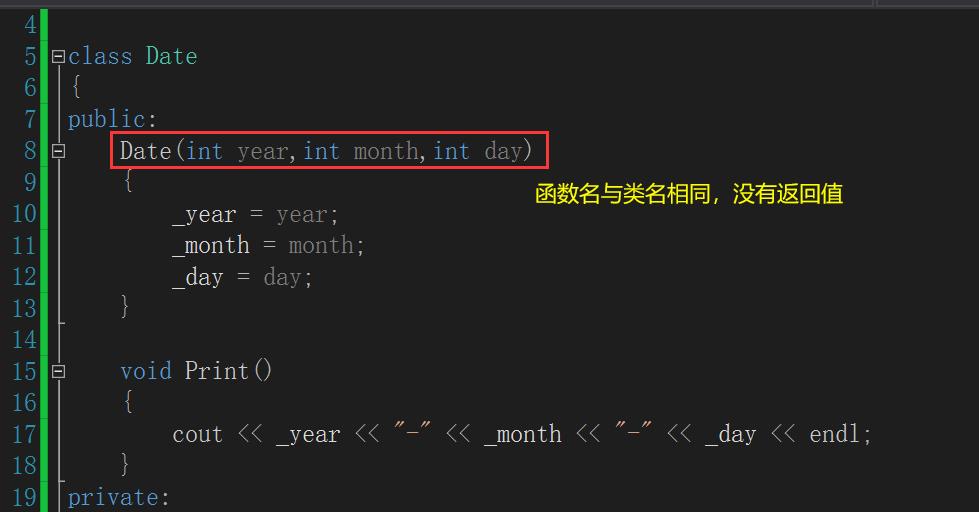C++类和对象(中篇)
Posted Suk-god
tags:
篇首语:本文由小常识网(cha138.com)小编为大家整理,主要介绍了C++类和对象(中篇)相关的知识,希望对你有一定的参考价值。
文章目录
类的6个默认成员函数
class Date ;
看起来这只是一个普通的空类!
但是当真里面什么都没有吗??
其实不然,尽管它是一个空类,编译器依旧会为其生成6个默认的成员函数
具体如下:

默认成员函数的特点?
就是 用户自己没有写,编译器会自动生成。一旦用户显式提供,那么就不再生成
下面我们一 一详细理解每个函数
构造函数
是一个特殊的成员函数
主要特点:
- 函数名与类名相同
- 没有返回值类型
- 创建类类型的对象的时候由编译器自动调用
- 在对象整个生命周期中只调用一次
- 构造函数可以重载
也可以在定义时给一个全缺省参数(无参 && 全参一次搞定)
代码验证:
情景一:使用编译器提供的默认构造函数,查看实例化一个对象到底做了什么

情景二:自定义一个构造函数,查看实例化对象做了什么

实验:

情景三:在上例的基础上,以Date d1的方式初始化会怎样?

情景四:用户实现一个构造函数,既可以传递参数,也适用于无参构造(全缺省构造)

此时就不会有报错了

注:无参构造函数、全缺省构造函数、我们没写编译器默认生成的构造函数,都可以认为是默认成员函数。
调用场景
创建新对象的时候,由编译器自动调用,并且在整个生命周期内只调用1次

编译器生成的默认构造函数到底有用没?
答案是有用的!
情景模拟:
前提:有两个类,分别是Time和Date类,Time类的对象作为Date类的一个成员变量。Date类没有自定义构造函数,Time类自定义了构造函数,我们实例化一个Date类的对象,观察现象:

分析构造过程如下:

析构函数
概念
是一个特殊的成员函数
与构造函数功能相反,析构函数不是完整对象的销毁,局部对象销毁工作是由编译器完成的。而对象在销毁时会自动调用析构函数,完成类的一些资源清理工作
特点
- 函数名是
~类名 - 无参数,无返回值
- 一个类有且仅有1个析构函数。若未显式定义,系统会自动生成默认的析构函数
- 对象生命周期结束时,C++编译系统自动调用析构函数
- 编译器自动生成的析构函数,对会自定义类型成员调用它的析构函数
验证:
在Date类中自定义析构函数,观察析构函数的调用场景



冷静分析一下,我们发现,我们实例化的对象d是在main函数的栈帧上开辟的空间,那我们在函数调用完毕后该函数的栈帧也就被释放,那么在该栈帧上的变量也就随之消亡。因此,在这种情况下,析构函数也就可有可无了。
但是析构函数还是有它的用武之地的~~看下面的例子
调用场景
前提:我们使用C++的方式实现一个栈的结构。它的具体操作如下:
//stack.h
#pragma once
#include <iostream>
using namespace std;
typedef int SDataType;
class Stack
public:
Stack();
~Stack();
void StackPush(SDataType x);
void StackPop();
SDataType StackTop();
int StackSize();
int StackEmpty();//1:空 0:非空
private:
void StackExpand();
private:
SDataType* _array;
int _size;
int _capacity;
;
//测试函数
void TestStack();
//stack.cpp
#include "stack.h"
Stack::Stack()
_array = (SDataType*)malloc(sizeof(SDataType)* 3);
if (nullptr == _array)
perror("malloc");
return;
_size = 0;
_capacity = 3;
void Stack::StackExpand()
//1、申请新空间(这里按照原空间的2倍申请)
int newCapacity = _capacity * 2;
SDataType* tmp = (SDataType*)malloc(sizeof(SDataType)*newCapacity);
if (nullptr == tmp)
perror("malloc");
return;
//2、将旧空间的值copy的新空间
for (int i = 0; i < _capacity; i++)
tmp[i] = _array[i];
//3、释放旧空间
free(_array);
//4、使用新空间
_array = tmp;
_capacity = newCapacity;
Stack::~Stack()
if (_array)
free(_array);
_size = 0;
_capacity = 0;
void Stack::StackPush(SDataType x)
if (_size == _capacity)
//扩容
StackExpand();
_array[_size++] = x;
void Stack::StackPop()
if (!StackEmpty())
_size--;
SDataType Stack::StackTop()
if (StackEmpty())
perror("StackEmpty!");
return -1;
return _array[_size - 1];
int Stack::StackSize()
return _size;
int Stack::StackEmpty()//1:空 0:非空
return 0 == _size;
void TestStack()
Stack s;
s.StackPush(1);
s.StackPush(2);
s.StackPush(3);
s.StackPush(4);
s.StackPush(5);
s.StackPush(6);
cout << s.StackSize() << endl;
cout << s.StackTop() << endl;
s.StackPop();
s.StackPop();
cout << s.StackSize() << endl;
cout << s.StackTop() << endl;
对于上述实现的代码,我们着重关注一下它的析构函数

我们可以看到,该析构函数对程序从堆上申请的资源进行了释放。如果没有该析构函数,那就会发生内存泄露。
因此,我们可以得到:
只要程序涉及到资源的申请,那么析构函数必须要程序员手动实现,默认的析构函数是无法达到我们的需求的。
拷贝构造函数
概念
只有单个形参,该形参是对本类类型对象的引用(一般常用const修饰) ,在用 已存在的类类型对象创建新对象的时候,由编译器自动调用。
特性
- 拷贝构造函数是构造函数的重载形式
- 拷贝构造函数的参数只有一个,并且必须使用引用传参,使用传值传参就会发生无穷递归

- 若未显式定义,系统生成默认的拷贝构造函数。
默认的拷贝构造函数对象按内存存储,按字节序完成拷贝,这种拷贝我们叫做浅拷贝或者值拷贝
浅拷贝在不涉及资源申请的类中可以正常使用,但是在涉及资源申请的类中是无法正常使用的
后者会在释放申请资源的时候,调用两次析构函数,导致程序崩溃 - 默认生成的拷贝构造不能满足申请资源的情况,因此需要我们实现深拷贝
典型调用场景
- 使用已经存在的对象创建新对象
- 函数参数类型为类类型对象
- 函数返回值类型为类类型对象
运算符重载
为什么要有运算符重载
一句话,就是为了提高代码的可读性
基本形式
- 是一个具有特殊函数名的函数,也具有其返回值类型,函数名字以及参数列表,其返回值类型与参数列表与普通的函数类似
- 函数名: 关键字operator后面加需要重载的运算符符号
- 函数原型: 返回值类型 operator操作符(参数列表)
注意事项
- 不能通过连接其他符号来创建新的操作符:比如 operator @
- 重载操作符必须有一个类类型或者枚举类型的操作数
- 用于内置类型的操作符,其含义不能改变。例如内置类型的+,不能改变其含义
- 作为类成员的重载函数时,其形参看起来比操作数数目少一,成员函数的操作符有一个默认的形参this限定为第一个形参
- 5个运算符不能重载

赋值操作符重载
- 形式
返回值类型 operator=(参数)....
- 参数类型
一般都是类类型对象的引用
相较于传值这样就会少了形参实例化的拷贝构造 - 返回值
一般返回 *this
是类类型对象的引用 - 检测是否在给自己赋值
if(this != &d)
来一个赋值操作符重载的例子

一个类如果没有显示定义赋值运算符重载函数,编译器也会生成一个,完成对象按字节序的值拷贝(浅拷贝)
和前面一样,对于需要申请资源的类来说,赋值运算符重载依旧需要我们自己编写,否则程序在最后析构的时候就会发生崩溃。
日期类实现
date.h
#pragma once
#include <iostream>
using namespace std;
class Date
public:
Date(int year = 2001, int month = 5, int day = 7);
void Print();
// 获取某年某月的天数
int GetMonthDay(int year, int month);
// 拷贝构造函数
// d2(d1)
Date(const Date& d);
// 赋值运算符重载
// d2 = d3 -> d2.operator=(&d2, d3)
Date& operator=(const Date& d);
// 日期+=天数
Date& operator+=(int day);
// 日期+天数
Date operator+(int day);
// 日期-天数
Date operator-(int day);
// 日期-=天数
Date& operator-=(int day);
// 前置++
Date& operator++();
// 后置++
Date operator++(int);
// 后置--
Date operator--(int);
// 前置--
Date& operator--();
// >运算符重载
bool operator>(const Date& d);
// ==运算符重载
bool operator==(const Date& d);
// >=运算符重载
inline bool operator >= (const Date& d);
// <运算符重载
bool operator < (const Date& d);
// <=运算符重载
bool operator <= (const Date& d);
// !=运算符重载
bool operator != (const Date& d);
// 日期-日期 返回天数
int operator-(const Date& d);
private:
int _year;
int _month;
int _day;
;
date.cpp
#include "date.h"
Date::Date(int year, int month, int day)
//检查日期的合法性
if (year >= 0 && month > 0 && month <= 12 && day > 0 && day <= GetMonthDay(year, month))
_year = year;
_month = month;
_day = day;
else
cout << "非法日期" << endl;
void Date::Print()
cout << _year << "-" << _month << "-" << _day << endl;
// 拷贝构造函数
// d2(d1)
Date::Date(const Date& d)
_year = d._year;
_month = d._month;
_day = d._day;
// 赋值运算符重载
// d2 = d3 -> d2.operator=(&d2, d3)
Date& Date::operator=(const Date& d)
if (this != &d)
_year = d._year;
_month = d._month;
_day = d._day;
return *this;
// 获取某年某月的天数
inline int Date::GetMonthDay(int year, int month)
static int dayArray[13] = 0, 31, 28, 31, 30, 31, 30, 31, 31, 30, 31, 30, 31 ;
int day = dayArray[month];
if (2 == month && ((year % 4 == 0 && year % 100 != 0) || year % 400 == 0))
day = 29;
return day;
/
// 日期+=天数
Date& Date::operator+=(int day)
if (day < 0)
*this -= -day;
else
_day += day;
while (_day > GetMonthDay(_year,_month))
//产生进位,调整为正确的日期格式
//减掉当月的天数,然后将月+1
_day -= GetMonthDay(_year, _month);
++_month;
//判断月是否越界,月满了的话年+1
if (_month > 12)
++_year;
_month = 1;
return *this;
// 日期+天数
Date Date::operator+(int day)
//日期不能发生变化,返回的是日期加上天数的结果(因此无法使用引用返回)
//可以复用+=
Date tmp(*this);
tmp += day;
return tmp;
// 日期-=天数
Date& Date::operator-=(int day)
if (day < 0)
*this += -day;
else
_day -= day;
while (_day <= 0)
//月先--,因为借的是上一个月的天数
--_month;
if (_month == 0)
--_year;
_month = 12;
_day += GetMonthDay(_year, _month);
return *this;
// 日期-天数
Date Date::operator-(int day)
//拷贝构造当前对象
Date tmp(*this);
//复用-=
tmp -= day;
return tmp;
///
// 前置++
Date& Date::operator++()
*this += 1;
return *this;
// 后置++(int是一个占位符,不起实际作用)
Date Date::operator++(int)
Date tmp(*this);
*this += 1;
return tmp;
// 后置--
Date Date::operator--(int)
Date tmp(*this);
*this -= 1;
return tmp;
// 前置--
Date& Date::operator--()
*this -= 1;
return *this;
/
// >运算符重载
bool Date::operator>(const Date& d)
if (_year > d._year)
return true;
else if (_year == d._year)
if (_month > d._month)
return true;
else if (_month == d._month)
if (_day > d._day)
return true;
return false;
// ==运算符重载
bool Date::operator==(const Date& d)
return _year == d._year &&
_month == d._month &&
_day == d._day;
// >=运算符重载
inline bool Date::operator >= (const Date& d)
return *this > d || *this == d;
// <运算符重载
bool Date::operator < (const Date& d)
return !(*this >= d);
// <=运算符重载
bool Date::operator <= (const Date& d)
return *this < d || *this == d;
// !=运算符重载
bool Date::operator != (const Date